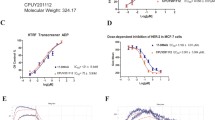Abstract.
Purpose: Radicicol is a novel hsp90 antagonist, distinct from the chemically unrelated benzoquinone ansamycin compounds, geldanamycin and herbimycin. Both geldanamycin and radicicol bind in the aminoterminal nucleotide-binding pocket of hsp90, destabilizing the hsp90 client proteins, many of which are essential for tumor cell growth. We describe here antitumor activity of a novel oxime derivative of radicicol, KF58333. We also investigated the mechanism of antitumor activity of KF58333 in comparison with its oxime isomer KF58332. Methods: Antiproliferative activities were determined in a panel of breast cancer cell lines in vitro. We also examined inhibition of hsp90 function and apoptosis induction in erbB2-overexpressing human breast carcinoma KPL-4 cells in vitro. Direct binding activity to hsp90 was assessed by hsp90-binding assays using geldanamycin or radicicol beads. In animal studies, we investigated plasma concentrations of these compounds after i.v. injection in BALB/c mice and antitumor activity against KPL-4 cells transplanted into nude mice. Inhibition of hsp90 function and induction of apoptosis in vivo were investigated using tumor specimens from drug-treated animals. Results: KF58333 showed potent antiproliferative activity against all breast cancer cell lines tested in vitro, and was more potent than its stereoisomer KF58332. These results are consistent with the ability of KF58333 to deplete hsp90 client proteins and the induction of apoptosis in KPL-4 cells in vitro. Interestingly, KF58333, but not KF58332, showed significant in vivo antitumor activity accompanied by induction of apoptosis in KPL-4 human breast cancer xenografts. Although the plasma concentrations of these compounds were equivalent, KF58333, but not KF58332, depleted hsp90 client proteins such as erbB2, raf-1 and Akt in the tumor specimen recovered from nude mice. Conclusions: These results suggest that inhibition of hsp90 function, which causes depletion of hsp90 client proteins in tumor, contributes to the antitumor activity of KF58333, and that the stereochemistry of the oxime moiety is important for the biological activity of radicicol oxime derivatives.
Similar content being viewed by others
Author information
Authors and Affiliations
Additional information
Electronic Publication
Rights and permissions
About this article
Cite this article
Soga, S., Sharma, S.V., Shiotsu, Y. et al. Stereospecific antitumor activity of radicicol oxime derivatives. Cancer Chemother Pharmacol 48, 435–445 (2001). https://doi.org/10.1007/s002800100373
Received:
Accepted:
Issue Date:
DOI: https://doi.org/10.1007/s002800100373




